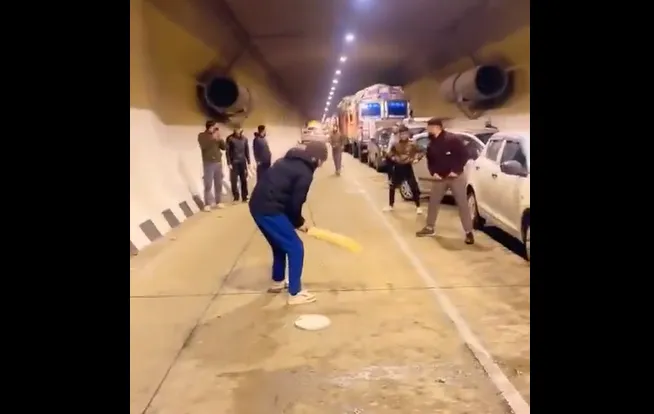 |
|
The recent heavy snowfall in Banihal, Jammu and Kashmir, has brought the region to a standstill, highlighting the vulnerability of the Jammu-Srinagar national highway, the lifeline connecting Kashmir to the rest of India. Hundreds of commuters found themselves stranded for over 20 hours, facing freezing temperatures and uncertainty. This incident underscores the critical need for improved infrastructure and emergency preparedness in the face of extreme weather conditions that frequently impact this mountainous region. The closure of the highway, the only all-weather road linking Kashmir to the rest of the country, caused significant disruption, impacting travel plans, tourism, and the delivery of essential goods and services. The sheer number of stranded individuals, including tourists and families with children, paints a picture of widespread inconvenience and distress. The experience of these individuals, forced to endure prolonged periods inside their vehicles without adequate facilities, reveals the inadequacies of current contingency plans. The fact that some individuals found respite in the unusual activity of playing cricket within the Navyug Tunnel is a testament to the resilience of the human spirit, yet it simultaneously highlights the stark reality of their prolonged wait and limited options.
The incident also brought to light the challenges faced by tourists visiting the region. Lakhpat Behal, a tourist from Chandigarh, described spending over 20 hours in his vehicle waiting for the highway to reopen. Similarly, a newlywed couple from Mumbai and families from Sangrur and Madhya Pradesh recounted their harrowing experiences. Their stories underscore the potential for disruptions to travel plans and the lack of readily available alternative accommodations in the event of highway closures. The incident emphasizes the need for improved communication and transparency from authorities to keep stranded individuals informed about the situation and anticipated reopening times. Furthermore, the absence of adequate provisions for stranded travellers, particularly those with children or elderly individuals, raises serious concerns about the welfare of tourists and the overall preparedness of the region for such weather-related emergencies.
Beyond the immediate impact on travellers, the snowfall has had a significant impact on the local economy. While locals in Ramban, Doda, and Kishtwar districts welcomed the snowfall as it broke a long dry spell and benefited agriculture and tourism, the closure of the highway disrupted business activities. The economic consequences of such closures extend beyond the immediate inconvenience to travellers, affecting local businesses, transportation services, and the overall economic activity of the region. The prolonged disruption caused by the snowfall necessitates a comprehensive review of the region's infrastructure and preparedness strategies. Investing in improved weather forecasting systems, developing alternative transportation routes, and enhancing emergency response protocols are crucial steps to mitigate the impact of future disruptions. Furthermore, providing better facilities and support mechanisms for stranded travellers is essential to ensure their safety and well-being.
The contrast between the plight of stranded commuters and the impromptu cricket match within the tunnel exemplifies the duality of the situation. While some battled frustration and discomfort, others found a way to alleviate the monotony of their forced confinement. The video circulating on social media underscores the power of human resilience even amidst challenging circumstances. It also raises broader questions about the provision of adequate facilities and emergency support for stranded individuals in similar scenarios. This incident serves as a reminder of the unpredictable nature of extreme weather events and the critical need for robust infrastructure, effective communication, and well-defined emergency response strategies to ensure the safety and well-being of commuters and tourists alike. The continued reliance on a single highway connecting Kashmir to the rest of the country poses a significant risk that future planning and investment should address.
The situation in Banihal highlights a larger issue concerning the infrastructural vulnerabilities of Jammu and Kashmir in the face of unpredictable weather patterns. The reliance on a single highway for essential transport links needs reassessment. The incident necessitates an in-depth review of emergency response plans, including improved communication systems, alternative transport routes, and enhanced accommodation facilities for stranded individuals. This should be coupled with increased public awareness campaigns to inform travellers of potential risks and precautions they can take. Furthermore, there is a need to explore innovative solutions, such as improved snow clearance techniques and the development of resilient transportation infrastructure, to minimize future disruptions and ensure the seamless flow of traffic to and from Kashmir. The incident serves as a stark reminder of the challenges faced by this region and the importance of long-term infrastructural development to address the vulnerability of its transport network.
Source: Snow strands hundreds of commuters in J&K’s Banihal; for some it’s cricket all right
